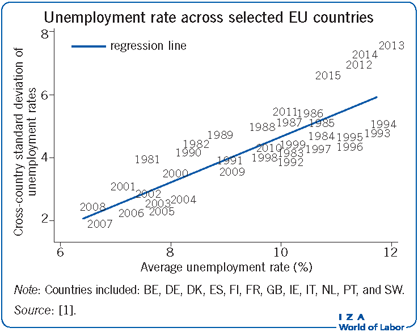Elevator pitch
Unemployment in Europe is excessively high on average, and is divergent across countries and population groups within countries. On the one hand, over the past decades, national governments have implemented incomplete institutional reforms to amend dysfunctional labor markets. On the other hand, EU supranational policies—those that transcend national boundaries and governments—have offered only limited financial support for active labor market policies, instead of promoting structural reforms aimed at improving the functioning of European labor markets. Better coordination and a wider scope of EU supranational policies is needed to fight unemployment more effectively.
Key findings
Pros
Some EU countries have effective institutional setups in place for handling shocks while avoiding high unemployment, indicating that best practices do exist.
Improvements in the EU coordination framework for employment policies could promote reforms to reduce unemployment.
A significant step forward would be the establishment of an EU unemployment insurance program and introduction of wage subsidies partially financed by EU funds and implemented using individual accounts.
Cons
Key reforms were not undertaken during the recent crisis, leaving many EU countries with semi-reformed labor markets that are still not fully capable of handling negative shocks.
The EU has lost credibility regarding its ability to coordinate policy, stabilize member economies, and promote efficient structural reforms.
EU supranational initiatives are often seen as a means of imposing unwarranted reforms that may not benefit specific member countries.
